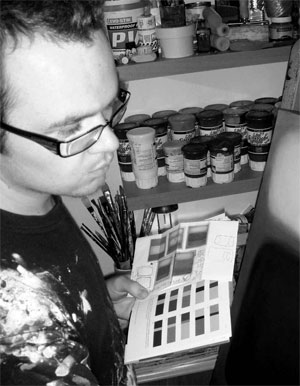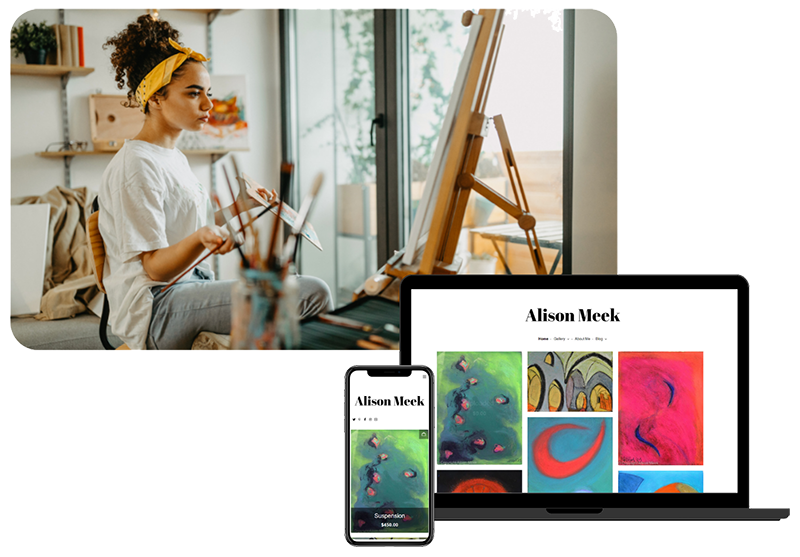This week we’ve been talking to painter Jason Adamson…
Part 1 – Practical Questions
1) – Do you think artists need to be able to talk about their work in order to exist?
How much of this business of artists having to talk about what they do is created by curators and galleries?
I don’t know where I stand on the whole ‘artists talking about their own work’ issue. Obviously if something needs explaining then go ahead, but if you need to explain a painting then surely as the artist haven’t you failed? I know and understand that art is subjective and very different to different people, so I don’t need to tell people what I think of my own work, that is for them to decide.
Although my work is weird and unusual, I make a point of not explaining it as ‘there is nothing to explain’ in my eyes, it needs to be taken at face value. People fear my work at times as they believe it is metaphorical and they don’t understand it, but if that is the case, then I am at a loss to explain the hidden message as well.
2) – How do you motivate yourself?
Motivation is a tough one: when I have no time, motivation is second nature as the thing I want to do most is paint (when I’m busy with other things); when I have all the free time in the world to paint it can be difficult to sit down at the easel. Similarly, if I have a show or commission deadline approaching I am usually easily motivated to get started, wheres if I am just painting in the hopes of a future show which has not been arranged, then sometimes I can feel at a loss. Basically, I think I thrive under stress and shortened time constraints. Additionally, I find that motivation can be linked to inspiration, or lack of it!
3) – What do you make of the art establishment? The text on your website shows a certain ambivalence, even dislike of it. This seems quite common among artists to me. What do you make of this tension?
The art establishment confuses me; sometimes I even wonder if its about the art at all!?! It has a very ‘in-crowd’ mentality and I am not sure what you are meant to do to be accepted by it. In the past I have approached galleries in London and been rudely ignored. Fair enough, my work may not be what they are looking for, but as soon as I know that I can go and do something about it and improve or change what I am doing.
4) – How do you feel about the process of juggling commercial and more purely artistic concerns in your work?
With regards to the whole ‘clinical cynical approach’ I think it is very common among the few artists I know. When I started painting I was very much against doing any commercial work. I just thought that my weird birds would be sufficient for me to break even with my hobby. However, as time went on I did the odd commercial painting, and more and more people wanted them. It all changed for me a year ago when the gallery In Bournemouth who I sell my work through just wanted commercial, original and with a high level of quality, artwork. It has been quite a success to date; I make the majority (probably all) of my art income selling these commercial works to the general public. Ironically, I can charge more for these types of work than I can the birds; I say ironic because when you think of weird and contemporary art in London it is massively more expensive than commercial works. I don’t think there is anything wrong with working in this way, and contrary to what I used to think, I don’t think it is ‘selling out’ on your true style. Art is an expensive hobby (well it is for me when I make regularly orders from the art supplier) and if you want to make it viable (some people may not) you have to sell your work.
Part 2 -Exciting and thrilling questions:
5) – How do you get started with a project?
I say I ‘finish’ paintings, but sometimes I am not happy with the outcome, occasionally I paint over works which are a few years old. In terms of a body of work I don’t think you ever finish; my various styles come and go/peak and trough depending on what is being commissioned and what I want to paint. Painting is definitely like a journey, and I can see real development and improvement in my work whatever that journey may be.
6) – One consequence of doing a degree in art does seem to be a desire to locate yourself within the ongoing story of art history, to get yourself grounded in theoretical standpoints relative to what other people have done or are doing. Do you have anything to say about that?
My art history knowledge is not degree level granted, but I do have an interest in the subject with a basic knowledge above that of A-level. When I have the opportunity to visit art galleries in other countries I always take it, and I especially enjoy seeing modern (20th century) art. I feel that trying to ‘locate yourself within the ongoing story of art history’ can work against you as an artist. Trying to predict what is en vogue, what will sell or where you may fit into the ‘story so far’ is quite detrimental to your art in my opinion, and artists should just be innovative and do what they enjoy painting.
7) – What do you think makes a painting good?
What I think makes a good painting is not what you or anyone else will think makes a good painting! Art is so subjective and that is why I do not get offended if people don’t like my work or criticize it; I don’t like everything I see. Personally speaking, what I think makes a good painting is something aesthetically pleasing, with a bold form, exciting and considered colour palette, and a quirky or unsuspected characteristic – nothing political or conceptual though! I like figurative and portrait paintings (untraditional), so I suppose that is why I like the work of Bellany and Kahlo.
8) – What influences you?
I get influenced by everything and anything I see on a daily basis, whether that be adverts, images from books or magazines, a scenario I see when I’m out, films, music, shows, photos. Aforementioned, my sketchbook is filled with things I rip and tear from flyers and magazines. Even this weekend I saw a quirky illustration of a dog in a bar magazine so I had that stuck in my sketchbook the next day. Travel is another main influence in my work and I really love ‘papery’ things (labels, banknotes, tickets, stamps) with a certain aesthetic, like Cyrillic, Arabic or Sanskrit lettering or weird imagery, and this is how my ‘Nostalgia’ series evolved. I have even started creating ‘country specific’ works, like ‘Suisse’ (on website under ‘new’) which has everything I collected from my last summer in Switzerland.
9) – And how do you think these influences work?
In terms of how I think these influences work, I just think my mind is very imaginative and attune to all the stimuli around me. A simple image/advert/song which someone else may skim over, I look at in such a way which starts my mind working and thinking about ideas; it’s an evolution of thoughts in a way, one thought leading to another. So in fact, the final idea which comes from the original influence may not resemble it at all, but it opens certain pathways in my mind to faint memories and weird recollections until I have something I can put on paper in a rough sketch.
What impact do I want my work to have??? I’m not really sure; I suppose I just want to make those that buy my work happy and to inspire others. Something that is thought provoking, in a positive way. At my summer show, someone fell in love with one of my small quirky canvases depicting a figure at night pointing into a pond. She is a young philosophy teacher with a 1st class degree and was so immersed in the painting at the time. She asked me what it was about and I said, as always, I don’t know it’s just an evolution of ideas. She, on the other hand, had such feeling for it that that she later bought the painting. I find it quite touching that something I painted could evoke such a strong emotion in someone else. To this day I don’t know what it means to her, and I probably never will; all I do know is that it has very personal meaning to her.
10) – What are you working on at the moment?
I’m quite busy at the moment which is exciting. When I finished my degree just last summer I wondered if this ‘art gap year’ was a good idea. But things obviously take time to get started and now I am quite positive about it all. I’ve recently submitted paintings for the Royal Academy summer show so I’ll have to wait and see what happens there.









